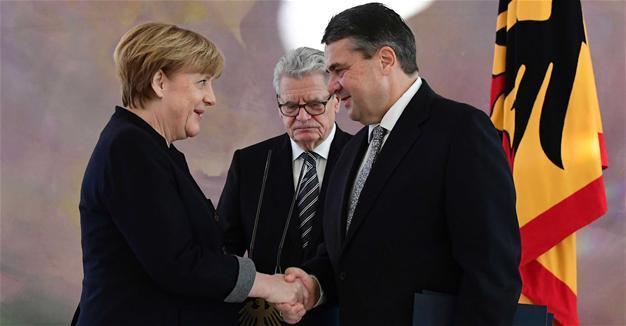Merkel, Hollande call for European unity in face of big challenges
BERLIN

German Chancellor Angela Merkel and French President François Hollande underscored the need for European unity in the face of growing internal and external threats, including the rise of populism across Europe and U.S. threats to abandon free trade.
“Europe faces big internal and external challenges which we ... can only master by working together,” Merkel told a news conference on Jan. 27 with Hollande.
“We need a clear, common commitment to the European Union, to what we have accomplished, and to the values of our liberal, democratic democracies,” she said.
Hollande said the rise of populists on the continent was a major threat for the European Union.
“To be very honest, what threatens Europe doesn’t only come from outside. It is also from inside. This means the rise of extremists who use external factors to cause disruption internally,” Hollande said.
Hollande said U.S. President Donald Trump’s administration poses “challenges” for Europe.
“Let’s speak very frankly, there are challenges, there are the challenges the U.S. administration poses to our trade rules, as well as to our ability to resolve conflicts around the world,” Hollande said.
“So we of course have to talk to Donald Trump since he was chosen by the Americans to be their president,” he said. “But we also have to do so with a European conviction and the promotion of our interests and our values.”
Merkel, without mentioning Trump by name, said: “We see that global conditions are changing dramatically and quickly. And we must respond to these new challenges, both in terms of defending a free society and defending free trade, as well as in terms of the economic challenges.”
The two leaders did not take questions.
Meanwhile, a recent poll late on Jan. 25 showed that as many Germans would vote for new Social Democrat (SPD) leader Martin Schulz as for conservative Merkel in a direct vote for chancellor, eight months before federal elections in September.
The Infratest dimap poll for ARD television, conducted on Jan. 25, put both at 41 percent, with support for Merkel down two points from September 2016 and for Schulz up five points.
The SPD nominated former European Parliament President Schulz on Jan. 24 to run against Merkel in the September election after Sigmar Gabriel said he would stand aside to boost the party’s chances. Schulz will officially be appointed leader on Jan. 29. Gabriel stepped down as economy minister to take over the Foreign Ministry portfolio from Frank-Walter Steinmeier, who is expected to become the country’s next president in February.
The poll showed that Merkel’s Christian Democratic Union (CDU) and its CSU Bavarian sister party would win 35 percent of the vote if it were held on Jan. 29, down two percentage points from the last poll.
The SPD would win 23 percent of the vote, an increase of three percentage points that the pollsters said was likely due to the news about Schulz.
The pro-environment Green party would win an unchanged 9 percent of the vote, with the anti-immigrant Alternative for Germany (AfD) party capturing 14 percent of the vote, a drop of one percentage point from the previous poll.
The Left party would win 8 percent of the vote, while the Free Democratic Party would win 6 percent, the poll showed.
 German Chancellor Angela Merkel and French President François Hollande underscored the need for European unity in the face of growing internal and external threats, including the rise of populism across Europe and U.S. threats to abandon free trade.
German Chancellor Angela Merkel and French President François Hollande underscored the need for European unity in the face of growing internal and external threats, including the rise of populism across Europe and U.S. threats to abandon free trade.